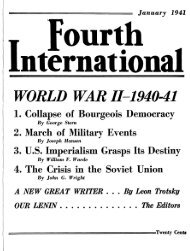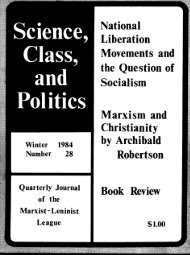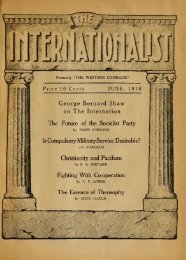The Stalin school of falsification - Marxists Internet Archive
The Stalin school of falsification - Marxists Internet Archive
The Stalin school of falsification - Marxists Internet Archive
Create successful ePaper yourself
Turn your PDF publications into a flip-book with our unique Google optimized e-Paper software.
<strong>Stalin</strong> School <strong>of</strong> Falsification - Chapter 5<br />
my alleged "underestimation <strong>of</strong> the peasantry"is utterly ridiculous, and at best is an attempt to hang<br />
Bukharin's position onto me-a position with which I had nothing in common. Not for a moment did I<br />
suppose that in 1917-1918 it was possible to rouse the peasant masses for a revolutionary war. In<br />
estimating the moods <strong>of</strong> the peasant and labor masses after the imperialist war, I was wholly in<br />
agreement with Lenin. If I stood, at the time, for postponing as long as possible the moment <strong>of</strong><br />
capitulation to Hohenzollern, it was not for the purpose <strong>of</strong> calling forth a revolutionary war but in order<br />
to arouse the workers <strong>of</strong> Germany and Austria-Hungary to as great a revolutionary activity as possible.<br />
<strong>The</strong> decision to announce a state <strong>of</strong> war as terminated, without signing a forced peace, was dictated by<br />
the intention <strong>of</strong> testing in action whether or not Hohenzollern was still able to wage war against the<br />
revolution. This decision was adopted by the majority <strong>of</strong> our Central Committee and approved by the<br />
majority <strong>of</strong> the fraction <strong>of</strong> the All-Russian Central Executive Committee <strong>of</strong> the Soviets. Lenin regarded<br />
that decision as the lesser evil since a very considerable section <strong>of</strong> the party leadership was for the<br />
Bukharinist "revolutionary war,"ignoring not only the condition <strong>of</strong> the peasants but also <strong>of</strong> the labor<br />
masses. <strong>The</strong> signing <strong>of</strong> the peace treaty with Hohenzollern exhausted entirely my episodic differences<br />
with Lenin on that question, and our work proceeded in complete harmony. Bukharin, on the other hand,<br />
developed his Brest-Litovsk differences with Lenin into an entire system <strong>of</strong> "Left Communism,"with<br />
which I had nothing in common.<br />
Many wiseacres seize every propitious occasion to scintillate on the subject <strong>of</strong> my slogan: No peace-no<br />
war. It obviously appears to them in contradiction with the very nature <strong>of</strong> things. Yet, between classes, as<br />
well as between states, relationships <strong>of</strong> "no peace-no war"are not at all rare. One need only recall that<br />
several months after Brest-Litovsk, when the revolutionary situation in Germany had completely defined<br />
itself, we announced that we were breaking the Brest-Litovsk peace without in any way resuming<br />
hostilities against Germany. With the countries <strong>of</strong> the Entente, in the course <strong>of</strong> the first few years <strong>of</strong> the<br />
revolution, our relationships were those <strong>of</strong> "no peace-no war."As a matter <strong>of</strong> fact, the same type <strong>of</strong><br />
relationship exists between us and England now (with the Tories in power). Throughout the<br />
Brest-Litovsk negotiations, the whole question was whether or not, at the beginning <strong>of</strong> 1918, a<br />
revolutionary situation had sufficiently matured in Germany to enable us, without continuing the war (we<br />
had no army!), to refrain from signing a peace. Experience showed that such a situation did not exist as<br />
yet.<br />
<strong>The</strong> meaningless "reviews"beginning with 1923 have completely distorted the sense <strong>of</strong> the Brest-Litovsk<br />
controversy. All the fictions concerning my line during the epoch <strong>of</strong> Brest-Litovsk are discussed in detail<br />
and refuted on the basis <strong>of</strong> the incontrovertible documents in the notes to Volume XVII <strong>of</strong> my Collected<br />
Work:<br />
<strong>The</strong> Brest-Litovsk disagreements, as I have already stated, did not leave the shadow <strong>of</strong> any bitterness in<br />
my personal relations with Lenin. Just a few days after the signing <strong>of</strong> the peace, I was placed-on the<br />
motion <strong>of</strong> Vladimir Ilyich-at the head <strong>of</strong> the military work.<br />
29. <strong>The</strong> conflict on the trade union question was sharper and more protracted. <strong>The</strong> new theoretician <strong>of</strong><br />
<strong>Stalin</strong>ism, the Menshevik, Martinov, who came to us on the wave <strong>of</strong> the N.E.P.,[19] has described the<br />
disagreement on the trade union question as a disagreement on the question <strong>of</strong> the N.E.P. On this subject,<br />
Martinov wrote in 1923:<br />
"L. Trotsky in 1905 argued more logically and consistently than either the Bolsheviks or the Mensheviks.<br />
But the flaw in his argument lay in that he was 'too consistent.' <strong>The</strong> picture which he drew very<br />
http://www.marxists.org/archive/trotsky/works/1937-st2/sf05.htm (4 <strong>of</strong> 20) [06/06/2002 15:06:23]

















